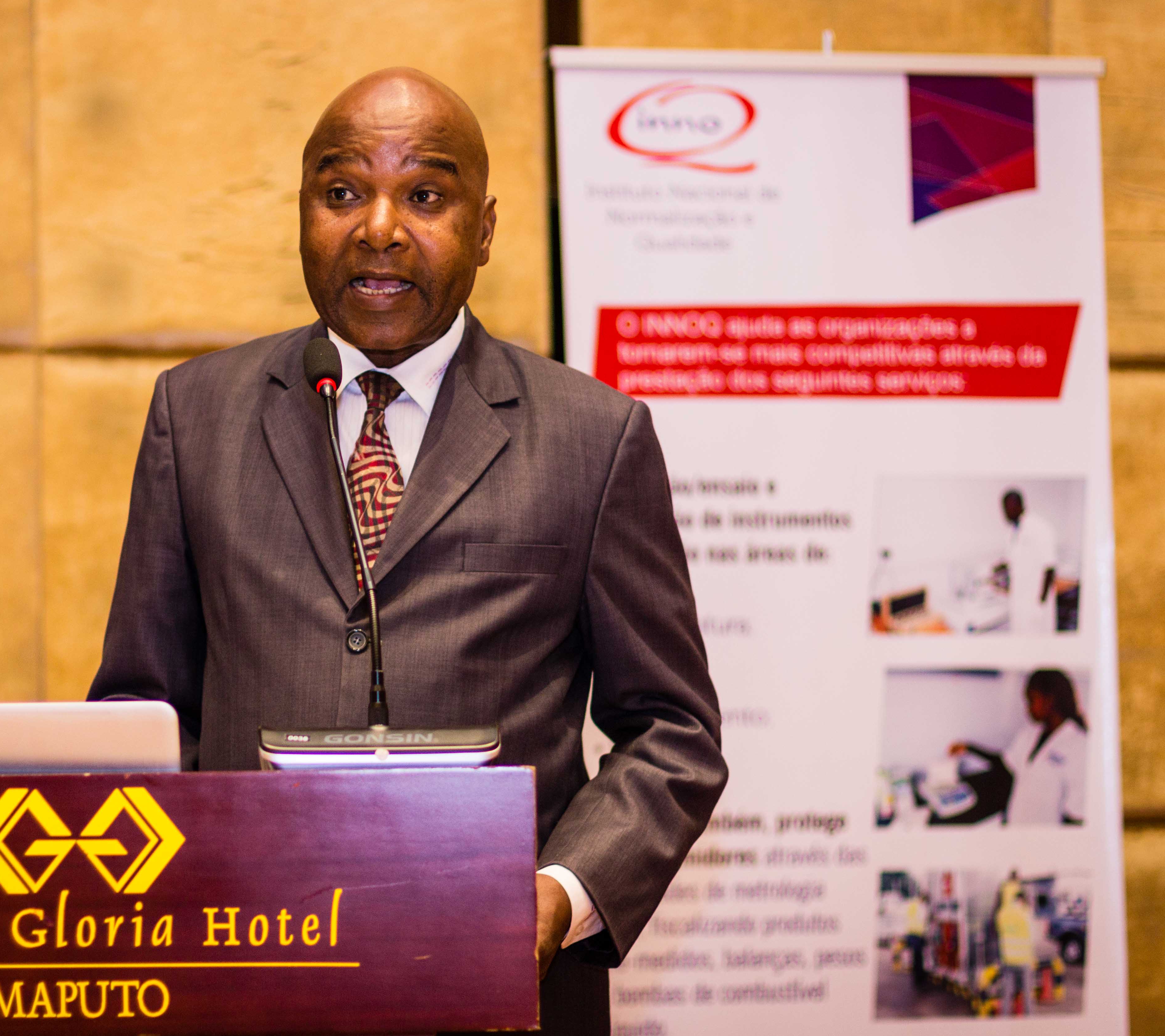Mozambique’s National Quality Infrastructure Enables Broad-Based Economic Growth

Director of INNOQ, Alfredo Sitoe
February 14, 2019
The Government of the Republic of Mozambique has just approved the “National Quality System Law” (SINAQ – Sistema Nacional de Qualidade), a key piece of legislation for trade and industrial growth as well as for protecting the health and safety of the Mozambican people.
SINAQ, well known as the National Quality Infrastructure (NQI), is the system comprising the organizations (public and private) together with the policies, relevant legal and regulatory framework, and practices needed to support and enhance the quality, safety and environmental soundness of goods, services and processes. It is the institutional framework that establishes and implements the practice of standardization, including conformity assessment, metrology, and accreditation.
Quality is a prerequisite for Mozambique’s economic success. It is well-recognized that a country’s ability to produce high quality products and services meeting international standards and best practices for certification and testing has a positive impact on economic growth. It is estimated that over 85% of global trade is affected by international standards. Traders, producers and suppliers must not only find a buyer, but they must also ensure that their products meet the safety requirements of both the domestic and export markets, as well as exceeding customers’ quality expectations. Strengthening Mozambique’s National Quality Infrastructure is directly related to new job creation, increase international trade, foreign investment, and consumer protection.
The Government of Mozambique has placed the link between quality, global trade, and export competitiveness at the forefront of the country’s trade policy. The removal of non-tariff / technical barriers to trade and implementation a regulatory system that includes a NQI that is WTO compliant and accepted internationally has become a central political task for Mozambique. Building an NQI is particularly important for Mozambique’s SME’s to meet the demands of the multilateral trading system and to provide credible proof that their products conform to international quality standards.
This is a complex challenge that must be met comprehensively by the public and private sectors, academia, trade associations, and other stakeholders. Private sector involvement is crucial to the overall success of a national quality program, as they are the ultimate beneficiaries of such a program. A properly developed and implemented NQI will minimize re-testing and re-certification requirements, eliminate many non-tariff barriers to trade and reduce market access delays.
Since 2017 the USAID-funded supporting the Policy Environment for Economic Development (SPEED+) project has been providing technical assistance and guidance to the Instituto Nacional de Normalização e Qualidade (INNOQ) in strengthening Mozambique’s National Quality Infrastructure. This has included raising awareness and engaging the private sector in the implementation of the NQI to enable increased verifiable quality of goods and services, and increased exports.
In 2018 SPEED+ teamed up with the USAID Standards Alliance program being implemented by the American National Standards Institute (ANSI), together with INNOQ, and conducted a series of workshops and informative training programs on the benefits on using international standards and conformity assessment procedures to facilitate trade and open new markets for Mozambique producers. In addition, these workshops created awareness for government regulators of the importance of international standards and conformity assessment as they relate to the World Trade Organizations TBT Agreement.
In 2018, SPEED+ launched a “Standards, Metrology and Conformity Assessment: Tools to Facilitate Trade and Market Access Handbook” at a joint workshop/ceremony with the USAID Standards Alliance program and the Mozambique National Institute of Standards and Quality (INNOQ). This 150-page interactive handbook developed by a SPEED+ technical expert was distributed to Government and private sector participants in both English and Portuguese. INNOQ considers this handbook a major asset to Mozambique’s efforts in promoting and creating awareness of the benefits of developing quality products and services based on international standards. The Handbook includes information about compliance with international standards and conformity assessment procedures that can facilitate business for Mozambican producers.
Looking forward to 2019, SPEED+ will work with the National Institute of Standards and Quality (INNOQ), the Institute for the Promotion of Small and Medium Enterprises (IPEME), Investment and Export Promotion Agency (APIEX), and other institutions to build capacity for SMEs to take advantage of the business opportunities created by the megaprojects that will be developed in the extractives sectors over the next ten years. SMEs that can meet international standards are qualified to compete for these business opportunities as well as improving their overall business practices. SPEED+ is planning to collaborate with INNOQ on a program for SME’s including “Leading Your Company to Successful ISO 9001 Certification” and “How Does ISO 9001 Certification Benefit Your Organization”. This program will include an ISO 9001 training program for SME’s and support the creation and development of a WTO TBT/SPS Enquiry Point inter-ministerial working group.
